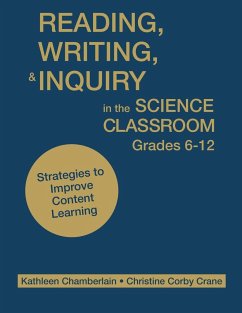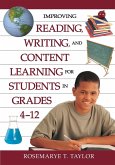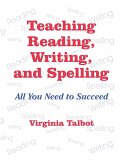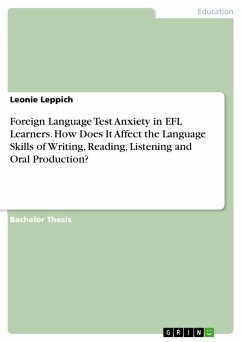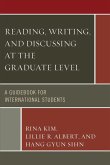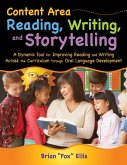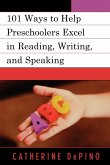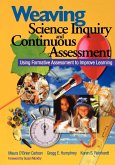Kathleen Chamberlain, Christine Corby Crane
Reading, Writing, and Inquiry in the Science Classroom, Grades 6-12
Strategies to Improve Content Learning
Kathleen Chamberlain, Christine Corby Crane
Reading, Writing, and Inquiry in the Science Classroom, Grades 6-12
Strategies to Improve Content Learning
- Broschiertes Buch
- Merkliste
- Auf die Merkliste
- Bewerten Bewerten
- Teilen
- Produkt teilen
- Produkterinnerung
- Produkterinnerung
This resource covers reading and writing practices, science standards, and sample lessons to help educators successfully integrate literacy and science instruction in any classroom.
Andere Kunden interessierten sich auch für
![Improving Reading, Writing, and Content Learning for Students in Grades 4-12 Improving Reading, Writing, and Content Learning for Students in Grades 4-12]() Rosemarye T. TaylorImproving Reading, Writing, and Content Learning for Students in Grades 4-1231,99 €
Rosemarye T. TaylorImproving Reading, Writing, and Content Learning for Students in Grades 4-1231,99 €![Teaching Reading, Writing, and Spelling Teaching Reading, Writing, and Spelling]() Virginia TalbotTeaching Reading, Writing, and Spelling45,99 €
Virginia TalbotTeaching Reading, Writing, and Spelling45,99 €![Foreign Language Test Anxiety in EFL Learners. How Does It Affect the Language Skills of Writing, Reading, Listening and Oral Production? Foreign Language Test Anxiety in EFL Learners. How Does It Affect the Language Skills of Writing, Reading, Listening and Oral Production?]() Leonie LeppichForeign Language Test Anxiety in EFL Learners. How Does It Affect the Language Skills of Writing, Reading, Listening and Oral Production?17,95 €
Leonie LeppichForeign Language Test Anxiety in EFL Learners. How Does It Affect the Language Skills of Writing, Reading, Listening and Oral Production?17,95 €![Reading, Writing, and Discussing at the Graduate Level Reading, Writing, and Discussing at the Graduate Level]() Rina KimReading, Writing, and Discussing at the Graduate Level45,99 €
Rina KimReading, Writing, and Discussing at the Graduate Level45,99 €![Content Area Reading, Writing, and Storytelling Content Area Reading, Writing, and Storytelling]() Brian EllisContent Area Reading, Writing, and Storytelling54,99 €
Brian EllisContent Area Reading, Writing, and Storytelling54,99 €![101 Ways to Help Preschoolers Excel in Reading, Writing, and Speaking 101 Ways to Help Preschoolers Excel in Reading, Writing, and Speaking]() Catherine Depino101 Ways to Help Preschoolers Excel in Reading, Writing, and Speaking48,99 €
Catherine Depino101 Ways to Help Preschoolers Excel in Reading, Writing, and Speaking48,99 €![Weaving Science Inquiry and Continuous Assessment Weaving Science Inquiry and Continuous Assessment]() Maura O'Brien CarlsonWeaving Science Inquiry and Continuous Assessment32,99 €
Maura O'Brien CarlsonWeaving Science Inquiry and Continuous Assessment32,99 €-
-
-
This resource covers reading and writing practices, science standards, and sample lessons to help educators successfully integrate literacy and science instruction in any classroom.
Hinweis: Dieser Artikel kann nur an eine deutsche Lieferadresse ausgeliefert werden.
Hinweis: Dieser Artikel kann nur an eine deutsche Lieferadresse ausgeliefert werden.
Produktdetails
- Produktdetails
- Verlag: Corwin
- Seitenzahl: 138
- Erscheinungstermin: 26. September 2008
- Englisch
- Abmessung: 280mm x 216mm x 8mm
- Gewicht: 368g
- ISBN-13: 9781412960717
- ISBN-10: 1412960711
- Artikelnr.: 24433866
- Herstellerkennzeichnung
- Libri GmbH
- Europaallee 1
- 36244 Bad Hersfeld
- gpsr@libri.de
- Verlag: Corwin
- Seitenzahl: 138
- Erscheinungstermin: 26. September 2008
- Englisch
- Abmessung: 280mm x 216mm x 8mm
- Gewicht: 368g
- ISBN-13: 9781412960717
- ISBN-10: 1412960711
- Artikelnr.: 24433866
- Herstellerkennzeichnung
- Libri GmbH
- Europaallee 1
- 36244 Bad Hersfeld
- gpsr@libri.de
Kathleen Chamberlain recently retired from Lycoming College in Williamsport, Pennsylvania, where she was an assistant professor of education and taught courses in curriculum and instruction, educational foundations, and literacy for secondary certification. While at Lycoming College, she also served as assistant dean for teaching effectiveness. She is a former teacher and administrator in K-12 schools. Chamberlain is the author of Middle Schools for a Diverse Society and journal articles about middle schools and science education and has conducted numerous workshops about teaching strategies, literacy, and student assessment. Currently, she is conducting research in a consortium of school districts that deals with addiction prevention programs for adolescents. A graduate of Indiana University of Pennsylvania, she earned her master's of science in education degree from Mansfield University of Pennsylvania. She has Pennsylvania administrative certifications from Bucknell University and she received her doctorate in curriculum and instruction from Pennsylvania State University, where she focused on middle-level education and school communities.
List of Figures
Preface
Acknowledgments
About the Authors
1. Constructing a Scientifically Literate Society
What Is Science?
What Is Scientific Literacy?
How Do We Reach Scientific Literacy?
Classroom Strategies
Questioning
Inquiry Teaching Models
5E Lesson Design
Generative Learning Model
Assessing Inquiry
Standards
Summary
2. Textbooks in the Science Classroom
Quality and Appropriateness of Textbooks
Readability of Texts
Students' Reading Abilities
Matching Texts and Students
Other Considerations for Textbook Evaluations
Strategies for Using Textbook Materials
Pre-Reading Activities
Vocabulary Development
Setting a Purpose for Reading
During Reading
Post-Reading Activities
Summary
3. Beyond the Textbook
Literature for Adolescents
Genres of Trade Books
Children's Books
Comic Books and Graphic Novels
Poetry
Nursery Rhymes and Children's Songs
Newspapers and Popular Magazines
Book Talks
Literature Circles
Summary
Books for Science
Selected Trade Books Mentioned in This Chapter
Web Sites Referenced
4. Writing in Science
Why Writing?
Types of Writing
Informal Writing Tasks
Formal Writing Tasks
Formal Scientific Writing
Formal Creative Writing Tasks
Assessing Students' Work
Creating the Environment
Summary
5. Using Technology to Enhance Reading, Writing, and Inquiry
Why Use Technology?
Getting Started
Hypermedia
Geocaching
Using the Internet
Webquests
Streaming Video
The Globe Program
Project Feeder Watch
Course Management Systems
Other Equipment
Digital Cameras
Handheld Computers
Data Analysis Programs
Databases
Spreadsheets
Technology and Writing
Inspiration
Claymation
Visual Communicator
Evaluating Software Programs
Challenges
Summary
Sources for Computer Programs Referenced in This Chapter
Web Sites Referenced in This Chapter
Additional Web Sites of Interest
References
Index
Preface
Acknowledgments
About the Authors
1. Constructing a Scientifically Literate Society
What Is Science?
What Is Scientific Literacy?
How Do We Reach Scientific Literacy?
Classroom Strategies
Questioning
Inquiry Teaching Models
5E Lesson Design
Generative Learning Model
Assessing Inquiry
Standards
Summary
2. Textbooks in the Science Classroom
Quality and Appropriateness of Textbooks
Readability of Texts
Students' Reading Abilities
Matching Texts and Students
Other Considerations for Textbook Evaluations
Strategies for Using Textbook Materials
Pre-Reading Activities
Vocabulary Development
Setting a Purpose for Reading
During Reading
Post-Reading Activities
Summary
3. Beyond the Textbook
Literature for Adolescents
Genres of Trade Books
Children's Books
Comic Books and Graphic Novels
Poetry
Nursery Rhymes and Children's Songs
Newspapers and Popular Magazines
Book Talks
Literature Circles
Summary
Books for Science
Selected Trade Books Mentioned in This Chapter
Web Sites Referenced
4. Writing in Science
Why Writing?
Types of Writing
Informal Writing Tasks
Formal Writing Tasks
Formal Scientific Writing
Formal Creative Writing Tasks
Assessing Students' Work
Creating the Environment
Summary
5. Using Technology to Enhance Reading, Writing, and Inquiry
Why Use Technology?
Getting Started
Hypermedia
Geocaching
Using the Internet
Webquests
Streaming Video
The Globe Program
Project Feeder Watch
Course Management Systems
Other Equipment
Digital Cameras
Handheld Computers
Data Analysis Programs
Databases
Spreadsheets
Technology and Writing
Inspiration
Claymation
Visual Communicator
Evaluating Software Programs
Challenges
Summary
Sources for Computer Programs Referenced in This Chapter
Web Sites Referenced in This Chapter
Additional Web Sites of Interest
References
Index
List of Figures
Preface
Acknowledgments
About the Authors
1. Constructing a Scientifically Literate Society
What Is Science?
What Is Scientific Literacy?
How Do We Reach Scientific Literacy?
Classroom Strategies
Questioning
Inquiry Teaching Models
5E Lesson Design
Generative Learning Model
Assessing Inquiry
Standards
Summary
2. Textbooks in the Science Classroom
Quality and Appropriateness of Textbooks
Readability of Texts
Students' Reading Abilities
Matching Texts and Students
Other Considerations for Textbook Evaluations
Strategies for Using Textbook Materials
Pre-Reading Activities
Vocabulary Development
Setting a Purpose for Reading
During Reading
Post-Reading Activities
Summary
3. Beyond the Textbook
Literature for Adolescents
Genres of Trade Books
Children's Books
Comic Books and Graphic Novels
Poetry
Nursery Rhymes and Children's Songs
Newspapers and Popular Magazines
Book Talks
Literature Circles
Summary
Books for Science
Selected Trade Books Mentioned in This Chapter
Web Sites Referenced
4. Writing in Science
Why Writing?
Types of Writing
Informal Writing Tasks
Formal Writing Tasks
Formal Scientific Writing
Formal Creative Writing Tasks
Assessing Students' Work
Creating the Environment
Summary
5. Using Technology to Enhance Reading, Writing, and Inquiry
Why Use Technology?
Getting Started
Hypermedia
Geocaching
Using the Internet
Webquests
Streaming Video
The Globe Program
Project Feeder Watch
Course Management Systems
Other Equipment
Digital Cameras
Handheld Computers
Data Analysis Programs
Databases
Spreadsheets
Technology and Writing
Inspiration
Claymation
Visual Communicator
Evaluating Software Programs
Challenges
Summary
Sources for Computer Programs Referenced in This Chapter
Web Sites Referenced in This Chapter
Additional Web Sites of Interest
References
Index
Preface
Acknowledgments
About the Authors
1. Constructing a Scientifically Literate Society
What Is Science?
What Is Scientific Literacy?
How Do We Reach Scientific Literacy?
Classroom Strategies
Questioning
Inquiry Teaching Models
5E Lesson Design
Generative Learning Model
Assessing Inquiry
Standards
Summary
2. Textbooks in the Science Classroom
Quality and Appropriateness of Textbooks
Readability of Texts
Students' Reading Abilities
Matching Texts and Students
Other Considerations for Textbook Evaluations
Strategies for Using Textbook Materials
Pre-Reading Activities
Vocabulary Development
Setting a Purpose for Reading
During Reading
Post-Reading Activities
Summary
3. Beyond the Textbook
Literature for Adolescents
Genres of Trade Books
Children's Books
Comic Books and Graphic Novels
Poetry
Nursery Rhymes and Children's Songs
Newspapers and Popular Magazines
Book Talks
Literature Circles
Summary
Books for Science
Selected Trade Books Mentioned in This Chapter
Web Sites Referenced
4. Writing in Science
Why Writing?
Types of Writing
Informal Writing Tasks
Formal Writing Tasks
Formal Scientific Writing
Formal Creative Writing Tasks
Assessing Students' Work
Creating the Environment
Summary
5. Using Technology to Enhance Reading, Writing, and Inquiry
Why Use Technology?
Getting Started
Hypermedia
Geocaching
Using the Internet
Webquests
Streaming Video
The Globe Program
Project Feeder Watch
Course Management Systems
Other Equipment
Digital Cameras
Handheld Computers
Data Analysis Programs
Databases
Spreadsheets
Technology and Writing
Inspiration
Claymation
Visual Communicator
Evaluating Software Programs
Challenges
Summary
Sources for Computer Programs Referenced in This Chapter
Web Sites Referenced in This Chapter
Additional Web Sites of Interest
References
Index

